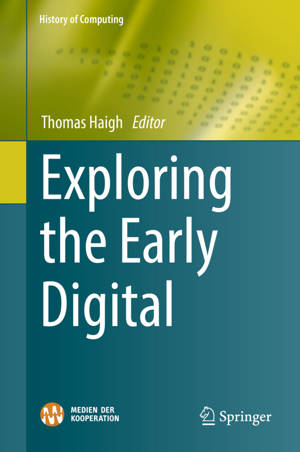
Wil je zeker zijn dat je cadeautjes op tijd onder de kerstboom liggen? Onze winkels ontvangen jou met open armen. Nu met extra openingsuren op zondag!
- Afhalen na 1 uur in een winkel met voorraad
- Gratis thuislevering in België vanaf € 30
- Ruim aanbod met 7 miljoen producten
Wil je zeker zijn dat je cadeautjes op tijd onder de kerstboom liggen? Onze winkels ontvangen jou met open armen. Nu met extra openingsuren op zondag!
- Afhalen na 1 uur in een winkel met voorraad
- Gratis thuislevering in België vanaf € 30
- Ruim aanbod met 7 miljoen producten
Zoeken
Omschrijving
Changes in the present challenge us to reinterpret the past, but historians have not yet come to grips with the convergence of computing, media, and communications technology. Today these things are inextricably intertwined, in technologies such as the smartphone and internet, in convergent industries, and in social practices. Yet they remain three distinct historical subfields, tilled by different groups of scholars using different tools. We often call this conglomeration "the digital," recognizing its deep connection to the technology of digital computing. Unfortunately, interdisciplinary studies of digital practices, digital methods, or digital humanities have rarely been informed by deep engagement with the history of computing.Contributors to this volume have come together to reexamine an apparently familiar era in the history of computing through new lenses, exploring early digital computing and engineering practice as digital phenomena rather than as enginesof mathematics and logic. Most focus on the period 1945 to 1960, the era in which the first electronic digital computers were created and the computer industry began to develop. Because digitality is first and foremost a way of reading objects and encoding information within them, we are foregrounding topics that have until now been viewed as peripheral in the history of computing: betting odds calculators, card file systems, program and data storage, programmable calculators, and digital circuit design practices. Reconceptualizing the "history of computing" as study of the "early digital" decenters the stored program computer, repositioning it as one of many digital technologies.
Specificaties
Betrokkenen
- Uitgeverij:
Inhoud
- Aantal bladzijden:
- 203
- Taal:
- Engels
- Reeks:
Eigenschappen
- Productcode (EAN):
- 9783030021511
- Verschijningsdatum:
- 10/05/2019
- Uitvoering:
- Hardcover
- Formaat:
- Genaaid
- Afmetingen:
- 208 mm x 239 mm
- Gewicht:
- 449 g

Alleen bij Standaard Boekhandel
+ 84 punten op je klantenkaart van Standaard Boekhandel
Beoordelingen
We publiceren alleen reviews die voldoen aan de voorwaarden voor reviews. Bekijk onze voorwaarden voor reviews.










